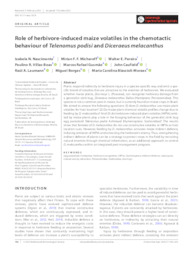Role of herbivore-induced maize volatiles in the chemotactic behaviour of Telenomus podisi and Diceraeus melacanthus.
Role of herbivore-induced maize volatiles in the chemotactic behaviour of Telenomus podisi and Diceraeus melacanthus.
Author(s): NASCIMENTO, I. N.; MICHEREFF, M. F. F.; PEREIRA, W. E.; BOAS, P. R. V.; GUSMAO, M. R.; CAUFIELD, J.; LAUMANN, R. A.; BORGES, M.; MORAES, M. C. B.
Summary: Plants respond indirectly to herbivore injury in a species-specific way and emit a specific blend of volatiles that are attractive to the enemies of herbivores. We evaluatedwhether maize plants, Zea mays L. (Poaceae), can recognize herbivory damage froma generalist stink bug, Diceraeus melacanthus Dallas (Hemiptera: Pentatomidae). Thisspecies is not a common pest in maize, but is currently found on maize crops in Brazil.We aimed to answer the following questions: (1) does D. melacanthus use maize plant volatiles for host location? (2) Do maize plant chemical volatile profiles change due to feeding by D. melacanthus? And (3) do herbivore-induced plant volatiles (HIPVs) emitted by maize plants play a role in the foraging behaviour of the generalist stink bug egg parasitoid Telenomus podisi Ashmead (Hymenoptera: Scelionidae)? The results show that females of D. melacanthus do not use constitutive volatiles or HIPVs as host location cues. However, feeding by D. melacanthus activates maize indirect defence,inducing emission of HIPVs and attracting the herbivore's enemy. Thus, strengthening indirect defence of plants can be a strategy to protect crops in the field by recruiting natural enemies through chemical information, as an additional approach to controlD. melacanthus within an integrated pest management program.
Publication year: 2023
Types of publication: Journal article
Unit: Embrapa Instrumentation
Observation
Some of Embrapa's publications are published as ePub files. To read them, use or download one of the following free software options to your computer or mobile device. Android: Google Play Books; IOS: iBooks; Windows and Linux: Calibre.
Access other publications
Access the Agricultural Research Database (BDPA) to consult Embrapa's full library collection and records.
Visit Embrapa Bookstore to purchase books and other publications sold by Embrapa.

